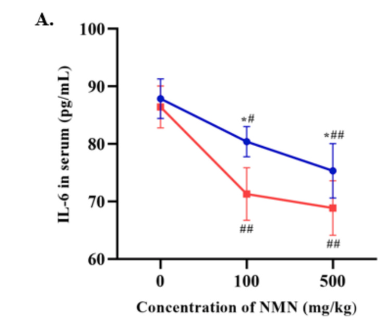Key Points
-
NMN reduced blood glucose and cholesterol
-
Markers of oxidative stress and inflammation were reduced
-
The metabolism of inflammatory fats was altered
Study Overview
Aging was modeled in mice by administering D-galactose, a compound that accelerates aging by increasing oxidative stress, promoting inflammation, and forming harmful metabolic byproducts.
The mice were divided into groups (n=20 per group):
-
Blank group: Received saline solution
-
Low NMN group: Received NMN (100 mg/kg BW)
-
High NMN group: Received NMN (500 mg/kg BW)
Researchers measured:
-
Locomotor activity
-
Levels of glucose, cholesterol, and inflammatory markers in blood
-
Levels of oxidative stress markers and enzymes involved in metabolism in liver tissue
-
Metabolomic analysis of plasma samples to assess changes in various small molecules
NMN Improved Metabolic Markers
NMN lowered blood glucose and total cholesterol in aging mice.
“These findings demonstrate that NMN may modulate the conversion and utilization of cholesterol and glucose.”
Inflammation and Oxidative Stress Were Reduced in NMN Group
Inflammatory molecules (IL-6 and TNF-α) were significantly reduced after supplementation.
“NMN supplementation demonstrably reduced the levels of IL-6 and TNF-α in the blood of aging mice compared to the blank model group.”
Clip Figure 2.A from the PDF version of this paper for this figure:
The chart below shows that an inflammation marker in mouse blood (IL-6) decreased as the amount of NMN given to the mice increased (from 0 to 500 mg/kg). This reduction was also greater after a longer time period (8 weeks, red line) compared to a shorter one (4 weeks, blue line).

NMN treatment also boosted protective antioxidant enzymes (SOD and GSH-Px) in the liver and lowered a marker of harmful oxidative stress (MDA).
Aging Pathways Altered by NMN
Metabolomic analysis showed that NMN supplementation altered the levels of various metabolites, including arachidonic acid (AA), a type of fat found in cell membranes that plays a key role in inflammation.
Importantly, NMN also reduced the activity of the enzyme lipoxygenase (LOX), which turns AA into pro-inflammatory compounds.
This suggests NMN may help shift arachidonic acid metabolism toward a less inflammatory state.
Conclusion
This study in mice suggests that NMN supplementation may have beneficial effects on several age-related changes, including metabolic dysfunction, inflammation, and oxidative stress.
“The findings from our present study clearly revealed that NMN supplementation could improve the antioxidant and immunity functions of aging animals and delay the aging process.”
NMN also appears to influence the way the body processes fat metabolites related to inflammation.




